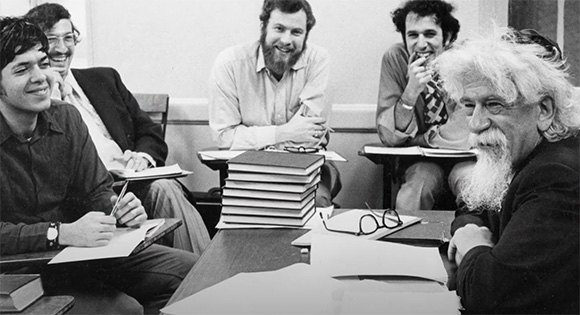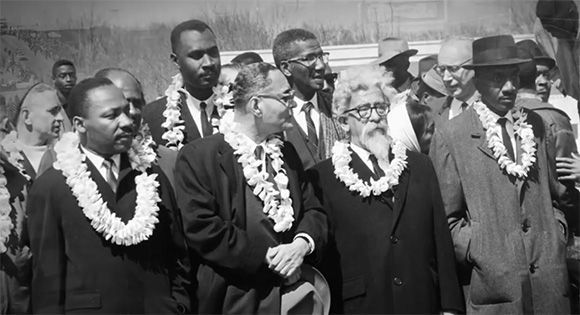Spiritual Audacity: The Abraham Joshua Heschel Story is streamed on some PBS networks and is also available on DVD.
In the Hebrew Bible, a prophet was not simply a person who foretold the future, as the term is widely used, but rather a truth-teller about the present, someone who saw what the world really was like and was moved into asking others to reduce its status quo and its injustices. The 20th century leader of the faith, Rabbi Abraham Joshua Heschel, was one such prophet, and Martin Doblmeier’s short but powerful documentary Spiritual Audacity: The Abraham Joshua Heschel Story makes this truth abundantly clear.
Born in Poland in 1907, Heschel witnessed some of the most devastating and exciting moments in recent history, and as his thoughtful writings and speeches, many of which are excerpted in Doblmeier’s film, were to experience these events without being involved no option. While other religious leaders sat idly on the sidelines during the Holocaust, the Vietnam War, and civil and racial justice movements in the United States, Heschel believed that true embodiment of faith was action. In one of his most famous quotes, taken from reflecting on his time marching in Selma, Alabama, with Rev. Dr. Martin Luther King, Jr., Heschel announced, “I felt like my legs were praying.” if it should have any effect at all.
Over the course of 57 brisk minutes, Doblmeier used archive photos and footage, sound clips and contributions from several Heschel-inspired spiritual luminaries to draw the arc of the life and legacy of this prophet. The film lays the foundation for his belief in his Hasidic upbringing, shows how loss and love shaped his increasingly controversial attitudes towards social justice, and culminates in his march in solidarity with King and his contemporaries.
It also gives a voice to those who, after his death, continue to honor his legacy through their own ongoing prophetic work. Lively talking heads include activists, politicians, religious leaders, academics, and historians including John Lewis, Jesse Jackson, Sharon Brous, Andrew Young, Taylor Branch, Walter Brueggemann, Cornel West, Michael Lerner, Arnold Eisen, and Heschel’s own daughter Dr. Susannah Heschel, who is herself a professor of Jewish studies. Doeblmeier cleverly mixes these interviews from the present with well-curated offers from the past and shows how far Heschel was and is really ahead of his time and present.
Heschel’s gift for punchy and inspiring language is pervasive, especially in the quote from which the film’s title comes, a line from a characteristically charged telegram that he sent to President John F. Kennedy in the 1960s, in which he wrote it urged that the growing cries be taken up for racial justice more seriously; it could have been written yesterday: ‘I propose, Mr President, to declare a moral emergency. The hour demands moral greatness and spiritual boldness. ”

Another powerful term from Heschel, “radical astonishment”, combines his fervent belief in the call for justice in the world with the awe and amazement that all human beings should feel in the presence of a God who enables us to pursue that justice . It is not enough for him to be amazed or angry; human response to the beautiful and the brutal is required and desired by God. If Heschel were just a talented word smith, that would arouse admiration, but the fact that he supported his learned articulation with unwavering action makes him one of the most telling role models for those who not only name the world’s problems, but also themselves want to commit to the change they hope to see.
Every moral movement to which Heschel committed himself continues to this day. Black bodies and lives are still being devalued and destroyed by white supremacist infrastructures and systems. Anti-Semitism is on the rise. The military-industrial complex continues to devour resources, while the money spent on violence could much better be used to create real economic justice. Fortunately, the spiritual audacity, moral grandeur, and radical amazement that Heschel advocated and exemplified have sown seeds that still nourish countless persistent belief-based justice movements. As an easy-to-digest introduction to the legacy of this truth-teller, Spiritual Audacity succeeds, but the true evidence of its power will be evident in the viewers, who it inspires to absorb the lessons of the past, read the present scriptures on the wall, and undertake to to carry the work that still needs to be done far into the future.

